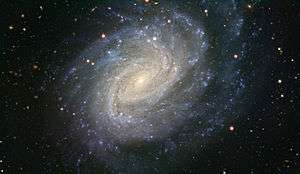NGC 1187
Coordinates: ![]() 03h 02m 37.40s, −22° 52′ 02.0″
03h 02m 37.40s, −22° 52′ 02.0″
| NGC 1187 | |
|---|---|
|
NGC 1187 has hosted two supernova explosions during the last thirty years, the latest one in 2007.[1] | |
| Observation data (J2000 epoch) | |
| Constellation | Eridanus[1] |
| Right ascension | 03h 02m 37.40s[2] |
| Declination | −22° 52′ 02.0″[2] |
| Redshift | 0.004657[2] |
| Helio radial velocity | 1393 km/s[2] |
| Distance | 60 million ly[1] |
| Apparent magnitude (V) | 11.4[2] |
| Characteristics | |
| Apparent size (V) | 5.370′ x 3.630′[2] |
| Other designations | |
| HIPASS J0302-22, MCG-04-08-016, UGCA 49, AM 0300-230, IRAS 03003-2303, NVSS J030237-225200, [CHM2007] LDC 251 J030237.58-2252017, 6dFGS gJ030237.6-225202, IRAS F03004-2303, PSCz Q03003-2303, [WDW2002] HIPASS J0302-22, DUGRS 480-001, LEDA 11479, RR95 70b, ESO 480-23, 2MASX J03023758-2252017, SGC 030024-2303.8, ESO-LV 480-0230, MBG 03004-2303, SINGG HIPASS J0302-22. | |
NGC 1187 is a spiral galaxy located about 60 million light-years away in the constellation of Eridanus. NGC 1187 has hosted two supernova explosions since the 1980s. In October 1982, the first supernova seen in NGC 1187 — SN 1982R was discovered at La Silla Observatory[1] and, in 2007, the amateur astronomer Berto Monard in South Africa spotted another supernova in this galaxy — SN 2007Y.[3]
References
- 1 2 3 4 "A Blue Whirlpool in The River". ESO Press Release. Retrieved 1 August 2012.
- 1 2 3 4 5 6 "Search results for NGC 1187". Astronomical Database. SIMBAD. Retrieved 1 August 2012.
- ↑ Stritzinger, Maximilian; Mazzali, Paolo; Phillips, Mark M.; Immler, Stefan; Soderberg, Alicia; Sollerman, Jesper; Boldt, Luis; Braithwaite, Jonathan; Brown, Peter; Burns, Christopher R.; Contreras, Carlos; Covarrubias, Ricardo; Folatelli, Gaston; Freedman, Wendy L.; Gonzalez, Sergio; Hamuy, Mario; Krzeminski, Wojtek; Madore, Barry F.; Milne, Peter; Morrell, Nidia; Persson, S. E.; Roth, Miguel; Smith, Mathew; Suntzeff, Nicholas B. (2009). "The He-rich core-collapse supernova 2007Y: Observations from X-ray to Radio Wavelengths". High Energy Astrophysical Phenomena. 696: 713–728. arXiv:0902.0609v2
 [astro-ph.HE]. doi:10.1088/0004-637X/696/1/713.
[astro-ph.HE]. doi:10.1088/0004-637X/696/1/713.
| Wikimedia Commons has media related to NGC 1187. |
This article is issued from Wikipedia - version of the 5/13/2016. The text is available under the Creative Commons Attribution/Share Alike but additional terms may apply for the media files.
